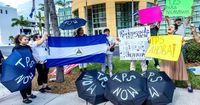On July 7, 2025, the Trump administration announced it would end Temporary Protected Status (TPS) for tens of thousands of migrants from Honduras and Nicaragua, a move that will take effect in about two months. The Department of Homeland Security (DHS) estimates that roughly 72,000 Hondurans and 4,000 Nicaraguans currently hold TPS, a program designed to protect foreign nationals from deportation when their home countries face dangerous conditions such as natural disasters or armed conflict.
TPS was first granted to citizens of Honduras and Nicaragua after Hurricane Mitch devastated Central America in 1998, killing over 10,000 people and causing widespread destruction. Since then, many of these migrants have lived in the United States for more than two decades, working, raising families, and contributing to their communities and the economy. In fact, approximately 21,000 Hondurans and 1,100 Nicaraguans covered by TPS have also obtained green cards, granting them permanent resident status.
Homeland Security Secretary Kristi Noem justified the decision to terminate TPS by stating that the conditions which warranted the designation have improved significantly. "Temporary Protected Status was designed to be just that — temporary," Noem said in a press release. She emphasized that Honduras has taken necessary steps to recover from Hurricane Mitch, adding, "Honduran citizens can safely return home, and DHS is here to help facilitate their voluntary return." The federal register notice highlighted Honduras' progress, noting it has become a "popular tourism and real estate investment destination," with 95.7% of its population having access to basic water, 83.8% to sanitation, and 93.2% to electricity.
Regarding Nicaragua, DHS stated that the environmental situation has improved enough to make it safe for citizens to return home. However, the agency did not address the authoritarian government of President Daniel Ortega, which has faced international criticism for human rights abuses, including arbitrary arrests and political repression.
This decision is part of a broader effort by the Trump administration to dismantle TPS programs for immigrants from multiple countries, including Afghanistan, Cameroon, Haiti, Nepal, Venezuela, and others. These moves have dramatically expanded the pool of immigrants at risk of deportation. While the administration argues that TPS must remain temporary to maintain the integrity of the immigration system, critics contend that ending protections for long-standing TPS holders will cause significant harm to families and communities.
U.S. Representative Pramila Jayapal, Ranking Member of the Subcommittee on Immigration, Integrity, Security, and Enforcement, strongly condemned the decision. She said, "The purpose of the TPS program is to offer legal status to people whose home countries are too dangerous to return to. The revocation of TPS is out of touch with the reality of conditions in Honduras and Nicaragua — and even the State Department’s own analyses of these countries." Jayapal emphasized that TPS recipients are not the "worst of the worst" as promised by the Trump administration but are individuals who have been in the U.S. for decades, contributing to society. "Forcing these people to leave the lives they’ve built to return to dangerous conditions is outrageous," she added. "TPS is legal immigration. We must work to protect this program and other means of legal immigration from Trump’s continued attacks on our legal system."
Similarly, Democratic Senator Catherine Cortez Masto of Nevada criticized the termination, stating, "These families have been here since the 1990s, working hard and contributing to our state and country for decades. Sending innocent families back into danger won't secure our border or make America safer. All it does is tear apart communities and hurt our businesses."
The Trump administration's efforts to end TPS protections have faced legal challenges. Earlier in 2025, a federal judge in San Francisco blocked the attempt to revoke TPS for Venezuelans, although the Supreme Court later paused that ruling. A federal judge in New York recently blocked the administration's attempt to end TPS protections early for Haitians, ruling that the administration lacked the authority to do so. The International Rescue Committee estimates that if TPS is terminated for Haitians as scheduled on September 2, 2025, up to 500,000 individuals could lose their work permits and legal status.
The DHS has encouraged migrants from Honduras and Nicaragua without permanent legal status to arrange voluntary departure through a Customs and Border Protection program, which offers incentives including a complimentary plane ticket and a $1,000 exit bonus. This policy aims to facilitate orderly self-deportations ahead of the TPS expiration.
TPS was created by a 1990 Act of Congress to provide temporary refuge for foreign nationals in the U.S. when their home countries are afflicted by war, natural disasters, or other extraordinary conditions. The designation is granted in increments of up to 18 months and does not provide a pathway to permanent residency or citizenship. Instead, it offers temporary protection from deportation and work authorization. The Trump administration’s recent moves to end TPS for multiple countries reflect a broader hardline stance on immigration, in line with President Trump’s campaign promises to reduce unauthorized immigration and enforce stricter immigration policies.
Despite the administration’s claims of improved conditions in Honduras and Nicaragua, many advocates and lawmakers argue that the reality on the ground remains precarious. Violence, political instability, and economic hardship continue to affect these countries, raising serious concerns about the safety of returning migrants. The revocation of TPS for these long-established communities in the U.S. has sparked fears of family separations, economic disruption, and humanitarian crises.
As the September deadline approaches, thousands of Hondurans and Nicaraguans face uncertainty about their futures in the United States. With legal challenges ongoing and political debate intensifying, the fate of TPS and the lives of those it protects remain at the center of a contentious immigration battle.


